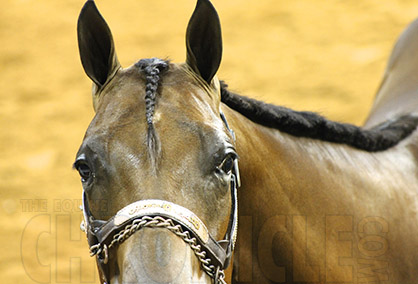New Research on “Ejaculate Economics”- Semen Composition in Stallions
According to a recent study*, stallions can alter the composition of their semen to optimize “ejaculate economics.”
The theory of ejaculate economics suggests that sperm production is a cost-benefit process. As such, situations involving competition for fertile females stimulate stallions to produce high-volume ejaculates when compared to situations in which no male competition exists or when mares are unlikely to conceive.
Here are five facts about semen composition that could prove valuable in equine breeding programs:
- Semen ejaculate not only contains spermatozoa but also seminal fluid. This fluid, the liquid portion of the ejaculate, delivers the sperm to the mare’s egg and contains proteins, hormones, antimicrobials, immunity suppressors, fats, sugars, salts, and different types of cells, including immunity cells. The seminal fluid, and composition thereof, presumably has an important impact on reproductive success.
- The composition of seminal fluid is thought to vary based on stallion genetics, environment conditions, life history, and social situation.
- Although measures of semen quality traditionally rely on the number of live sperm cells per ejaculate, anatomy of those sperm cells, and progressive motility, other factors also impact fertility. For example, sperm velocity (the speed at which they move) and sperm longevity (lifespan) can also influence measures of reproductive success.
- Research based on changes of the seminal fluid primarily involves lower vertebrates or those with high female reproductive potential. Research in horses proves more challenging because mares bear only one offspring per pregnancy and have a prolonged gestation period compared to other animals.
- The researchers concluded that “stallions invest more into their seminal fluids when the chance of fertilization is elevated, and that this adjustment of ejaculate quality can happen very quickly.”
“The study also noted that oxidative damage can decrease fertility and sperm storage ability, or sperm lifespan, within the female reproductive tract. Fish oil supplements containing omega-3 fatty acids such as EO•3 have many positive effects on reproductive success in horses and possess natural antioxidant properties,” added Kathleen Crandell, Ph.D., a nutritionist with Kentucky Equine Research (KER).
*Jeannerat, E, F. Janett, H. Sieme, et al. 2017. Quality of seminal fluids varies with type of stimulus at ejaculation. Scientific Reports. 7:44339.
Article reprinted courtesy of Kentucky Equine Research (KER). Visit equinews.com for the latest in equine nutrition and management, and subscribe to The Weekly Feed to receive these articles directly (equinews.com/newsletters).











